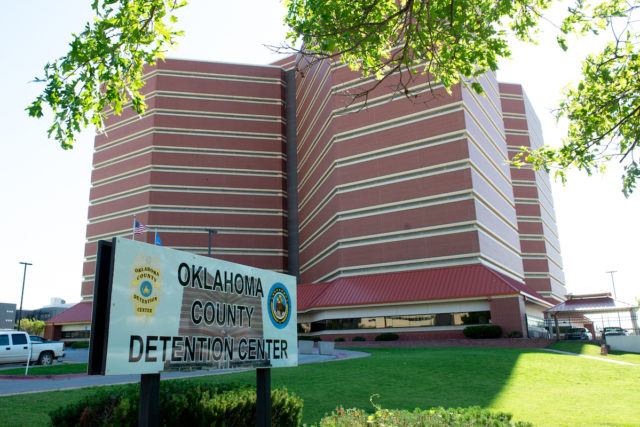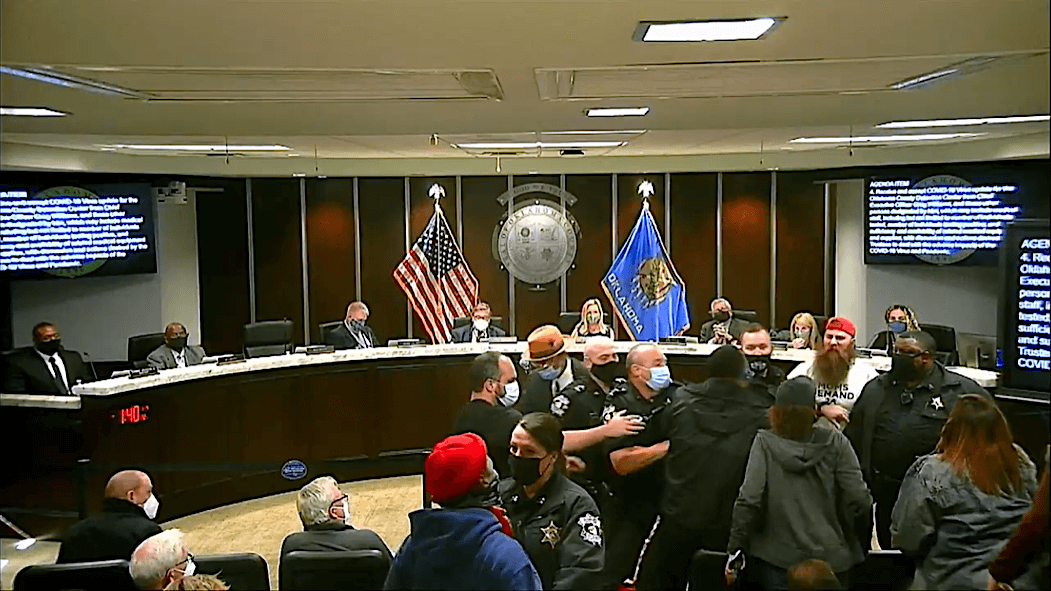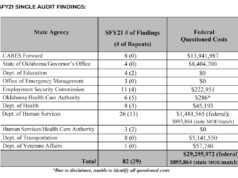
COVID-19 infections are increasing at the Oklahoma County Jail thanks to the Delta variant, jail administrator Greg Williams told the jail trust today.
The rising number of infections, mitigation efforts and a blistering report from the Oklahoma State Department of Health on jail conditions were among the top agenda items discussed during the 81-minute meeting.
Delta variant fuels rise
Williams told members of the Oklahoma County Criminal Justice Authority — called the jail trust — that staff administered 230 tests for COVID-19 last week. Of that total, 29 were positive.
That’s a marked rate increase from a period beginning June 16 through last week when more than 750 tests were performed yielding just 31 positive results.
Williams said COVID-19 cases climbing at the Oklahoma County Jail reflects the statewide picture.
“The jail is a microcosm of the community, so the numbers at the detention center mirror what’s happening in the communities,” he said. “These numbers are likely to go up from here.”
Williams said all detainees are tested for the virus when they are brought to the jail, and all are offered a vaccine. He said vaccine uptake is low among those who are offered the shot. Williams said they have a choice between all three of the currently approved vaccines.
“If symptoms become severe, they are taken to the hospital,” he said. “We have increased our hand washing, our PPE stations and we have sprayed the cells and lots of the high-traffic areas in the jail with a chemical that kills viruses.”
Multiple people are often held in the same cell. Williams said those who test positive for the virus are typically left in the same cell as before, given the risk that cellmates have already been exposed. Williams said separating people after exposure risks spreading the virus.
“We test all the people, but as a matter of routine, if someone tests positive in that cell everyone is positive,” Williams said.
Trustee Francie Ekwerekwu questioned the practice of keeping those who haven’t tested positive in cells with people who have.
“What you’re saying, it makes sense coming from an operational standpoint, but I don’t think it places the correct value on the human life given they are suffering from a potentially deadly virus that they could be spreading to another person just because that person has already been in a cell with them,” she said. “So that part doesn’t make sense to me.”
Williams said the issue of exposure has been one of the most complicated aspects of COVID-19 mitigation efforts.
“Getting a good grasp on who in this jail is contagious has been very difficult, and that has been the challenge all along,” he said.
Juveniles moving out
Some juvenile detainees are being moved out of the Oklahoma County Jail following a blistering letter from the State Department of Health last week that followed a surprise inspection of the facility by officials last month. The state agency directed the jail to remove juvenile detainees owing to health concerns and an inability to isolate youths from adults.
Currently, Williams said 13 juveniles remain in the jail, all on first-degree murder charges. It’s not clear what will be done with those detainees, but Williams said he is searching for options, although judges ultimately make the decision on where people are held.
Williams said one juvenile who was being held on a lesser offense and another, who had his charges reduced to second-degree murder, have been moved out of the jail into other facilities.
Trust Chairman Jim Couch said he and his fellow members are looking for guidance.
RELATED
Six months in, Oklahoma County’s jail trust is a chaotic mixed bag by Matt Patterson
“That’s an issue that’s out there, trying to determine what is the most appropriate place for them,” Couch said. “So, there are discussions right now with some judges to determine where we need to be as we go forward. We need someone to tell us if they need to be in the Oklahoma County facility or somewhere else. We can’t make that determination, so we’re looking for some guidance in that area from judges.”
Ekwerekwu countered that continuing to house juveniles, regardless of their charges, was a violation of the agency order.
“The law is the law,” she said. “We’re not to house them. In addition, we have a Health Department review that says we have no business housing them.”
Couch responded by saying the situation is complicated, partially by a new law taking effect later this year.
“The law may be the law, but it appears there may be multiple interpretations of the law at this point in time,” he said. “And of course, the other issue is that the law that goes into effect Nov. 1 which doesn’t allow juveniles in county facilities.”






















